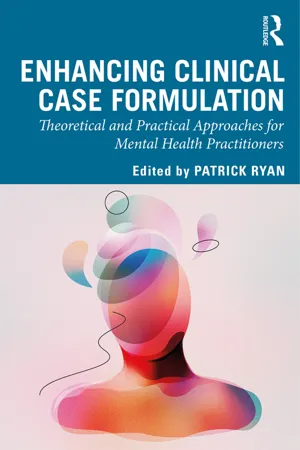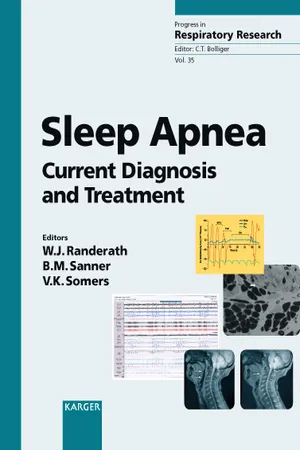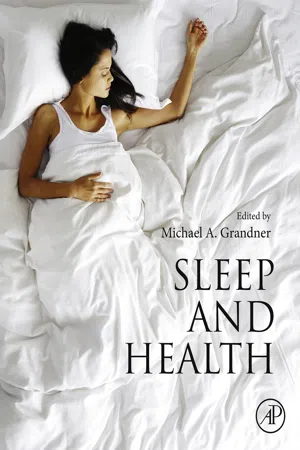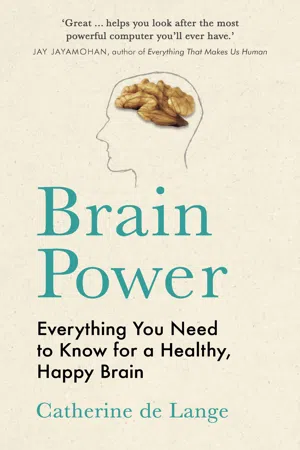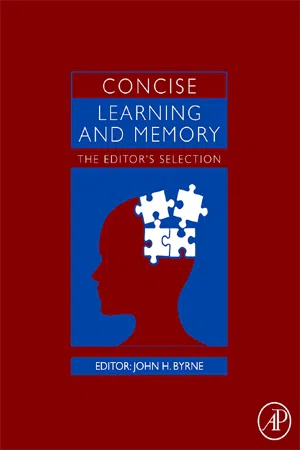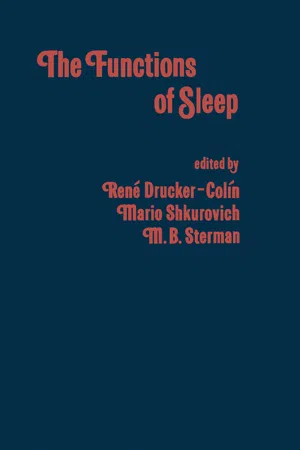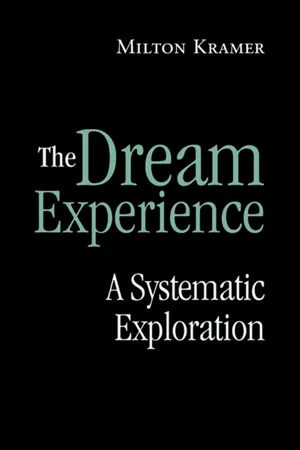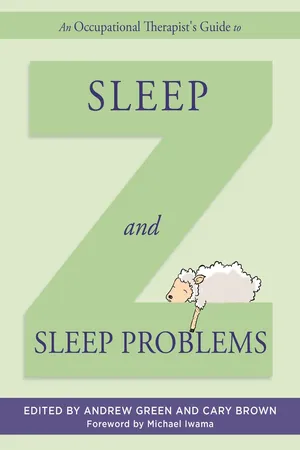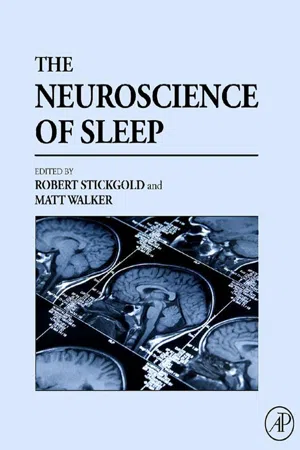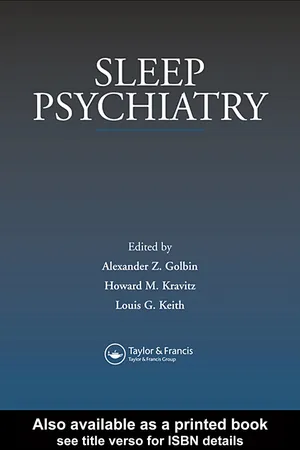Psychology
Functions of Sleep
The functions of sleep include physical restoration, cognitive processing, and emotional regulation. During sleep, the body repairs and regenerates tissues, while the brain consolidates memories and processes information. Sleep also plays a role in regulating emotions and maintaining overall well-being. These functions are essential for maintaining physical and mental health.
Written by Perlego with AI-assistance
Related key terms
1 of 5
11 Key excerpts on "Functions of Sleep"
- eBook - ePub
Enhancing Clinical Case Formulation
Theoretical and Practical Approaches for Mental Health Practitioners
- Patrick Ryan(Author)
- 2019(Publication Date)
- Routledge(Publisher)
Chapter 6 Sleep Kristina Cahill, Julie Lynch, and Patrick RyanChapter topicsIntroduction• Fundamental characteristics of sleep including stages, optimal duration and regularity• Relationship between sleep and cognitive and emotional processing• Sleep and mental health: a causal factor or just a correlation?• Successfully integrating information on sleep into clinical interviewSleep is a fundamental part of daily routine, with the majority of individuals spending approximately one third of their lives in this state (Killgore 2010). While the exact biological purpose may remain a mystery (Assefa, Diaz-Abad, Wickwire and Scharf, 2015), scientists agree that sleep plays a vital role in brain function and is deeply embedded within the various processes that contribute to our everyday functioning, across many body systems that lead to the restoration of the body and brain. Numerous factors can contribute to sleep disruption, including lifestyle, environmental factors and specific medical conditions, with adverse short and long-term consequences for the individual involved. A highly complex, bidirectional relationship between sleep and mental health has been widely documented in the literature. Despite this, information on sleep remains largely excluded from traditional psychological formulation. More recently however, experts in the field have started to recognise that sleep disruption is a neglected factor that contributes to the instigation or maintenance of mental health issues, and that sleep has “powerful diagnostic and therapeutic potential that we are yet to fully understand or make use of” (Walker, 2017, p. 150).The process of clinical formulation aims to provide a psychological understanding of a person’s difficulties and generally act as a guide for the clinician towards a particular intervention plan to help address these difficulties (Brown and Völlm 2013). Despite this core skill being considered the ‘bread and butter’ of mental health practitioners particularly in the field of psychology, clinicians can tend to approach case formulation with some apprehension, as it can be a struggle to assimilate substantial quantities of information into a coherent workable, framework. Upon examination of the traditional models of formulation (i.e., behavioural, psychodynamic and systemic), it becomes clear that the emphasis in each approach varies and relies on different information from the clinical assessment. In cognitive behavioural approaches, constructing a formulation focuses on presenting, precipitating, perpetuating, predisposing and protective factors (Dudley and Kuyken 2014). The psychodynamic perspective focuses on a combination of the dynamic, developmental, structural and adaptive patterns in which individuals approach inner conflict (Leiper 2014). Finally, the systemic perspective constructs a formulation around the nature of the interpersonal interactions between the individual and their wider systems, particularly the family system (Dallos and Stedmon 2014). Although each have their own merits and relevance for how to approach an individual case, they are also limited in terms of the boundaries they place on what type of information is incorporated into the formulation. Information that may be integral to understanding a person’s difficulties (e.g., sleep patterns and disruptions) may be lost, greatly reducing the practitioner’s capacity to generate a comprehensive profile of the individual and their difficulties, thus limiting important opportunities for intervention. - eBook - PDF
Sleep Apnea
Current Diagnosis and Treatment
- W. J. Randerath, B. M. Sanner, V. K. Somers, J. J. F. Herth(Authors)
- 2006(Publication Date)
- S. Karger(Publisher)
Abstract Sleep has a restorative function which is more than rest. Sleep is an active process which follows its own program with a sequence of different sleep stages and autonomous nervous system functions related to them. Slow wave sleep is mainly related to physical recreation with humoral and neuro-endocrine excretions activated. REM sleep is mainly but not exclusively related to mental recreation with associated dream-ing and memory functions. The autonomous nervous system with ventilation, cardiocirculatory, vascular and temperature regulation differs between slow wave sleep and REM sleep. More regular control is found in slow wave sleep and more variability is found in REM sleep. The sleep processes follow a well-described temporal pattern with sleep cycles of a duration between 80 and 11 0 min.The sleep process itself is embedded in the circadian rhythm and occurs naturally during the dark phase of the day with a mean duration of 7–8 h. In order to study sleep disorders, the knowledge about physiological sleep, physiological effects of sleep deprivation, and autonomic and endocrine functions associated with it, is essential. The key question for sleep physiology, why we sleep, is still unanswered. It is well studied that many restorative functions are linked to the sleep process. Physical recre-ation, endocrine and immune functions are closely linked to sleep. Mental restoration, memory consolidation, mood and behavior are also dependent on a healthy and undisturbed sleep. Our knowledge about the mechanisms of sleep-wake states is increasing even if their neuro-anatomical locations still have not been found [1]. All physiological functions are embedded in the circadian day-night cycle. The sleep-wake cycle is closely linked to the circadian cycle and both influence each other. For the newborn child, the adaptation of the sleep-wake cycle to the circadian cycle takes some time and is part of the develop-ment process. - eBook - ePub
- Michael A. Grandner, Michael Grandner(Authors)
- 2019(Publication Date)
- Academic Press(Publisher)
Introduction
We live in a society that operates around the clock, often forgetting that sleep is important. In fact, insufficient sleep has become a public health epidemic and is often overlooked as a serious problem [1] . While the National Sleep Foundation recommends adults sleep > 7 h per night [2] , 35% of adults in the United States sleep less [3] . Most people have suffered from sleep loss, either chronic or acute, at some point in their lives whether it be due to a new baby, stress, studying for an exam, or other circumstances. However, many people fail to realize the negative impact sleep loss has on cognitive functioning and how this has far-reaching real-world implications. In fact, insufficient sleep is common in several safety-critical occupations, including medical professionals, military personnel, airline pilots, and truck drivers, just to name a few. Thus, it is important to understand how sleep loss impacts various aspects of cognition.The present chapter provides an overview of the effects of sleep loss on several major cognitive domains. First, it is important to discuss the underlying neurobiological mechanisms that regulate sleep and wake, and thus modulate cognitive performance. We must also appreciate that human cognitive capacities are complex, with higher-order processes (e.g., executive functions, decision-making) building upon a foundation of elementary processes (e.g., attention). Therefore, this chapter will offer a discussion of how sleep loss impairs alertness, sustained attention, and vigilance. Additionally, we will discuss the importance of considering how inter-individual differences are related to relative resistance or vulnerability to cognitive impairment. We will then build upon these elementary capacities and focus on the consequences that sleep loss has on several complex executive function domains including working memory, inhibitory control, cognitive control, problem solving, risk-taking, and decision-making. - eBook - ePub
Brain Power
Everything You Need to Know for a Healthy, Happy Brain
- Catherine de Lange(Author)
- 2022(Publication Date)
- Michael O'Mara(Publisher)
PART 2SLEEPSleep is one of the most paradoxical things we do. If we think about it in evolutionary terms, it doesn’t seem to make sense for animals, including humans, to switch off our conscious awareness on a daily basis, turning us into sitting ducks for prowling predators. And yet all animals do it. We humans spend a third of our lives sleeping. So you’d expect sleep to have an obvious purpose, something so absolutely vital that it outweighs the deadly risks.And yet we are still far from understanding the purpose of sleep. Fortunately, research has given us plenty of ideas about why we do it, several of which are discussed in the following chapters. One clear and important role of the sleeping brain is to help us lay down new memories and connect them up to those we already have (see Chapter 5 ). Without memory there would be no learning, and it is arguably in part the ability to learn that has got us where we are today as a species, so perhaps this is the trade-off for the vulnerability that comes with sleep.Technologies that allow us to study the sleeping brain have also shed light on exactly what happens inside our heads during those unconscious hours, and a mountain of evidence is revealing just how important it is for mental health and for keeping our brains in shape as we age. For instance, sleep seems to be an important piece of the Alzheimer’s puzzle, as we discover in Chapter 6 – an exciting idea that could lead to new ways to detect, prevent and even treat the disease.Some elements of sleep – most notably dreaming, another mysterious element of our state of slumber – also seem to play an important role in processing our emotions, with important consequences if we don’t get enough.And whatever the true purpose of sleep, we all know from experience how terrible a bad night can make us feel. Not getting enough shut-eye, or sleeping at the wrong times, can be dangerously detrimental to our cognitive function, as we explore in Chapter 7 , and impacts on our mental health, as we see in Chapter 8 - eBook - PDF
Concise Learning and Memory
The Editor's Selection
- (Author)
- 2010(Publication Date)
- Academic Press(Publisher)
Numerous hypotheses have been put forward to explain the Functions of Sleep, including energy con-servation, brain detoxification, immune regulation, tissue restoration, and predator avoidance. More recently, the hypothesis that sleep plays a key role in the consolidation of memories has gained consid-erable attention (Smith, 1985; Maquet, 2001; Smith, 2001; Stickgold et al., 2001). Following two seminal papers in 1994 (Karni et al., 1994; Wilson and McNaughton, 1994), the publication rate on this topic increased fivefold over the next 10 years (Stickgold and Walker, 2005). Despite this resurgence of attention, the question of how sleep contributes to memory consolidation is actually quite old. In the first century AD, the Roman rhetorician Quintilian, commenting on the benefits of sleep, noted that ‘‘what could not be repeated at first is readily put together on the following day; and the very time which is generally thought to cause forgetfulness is found to strengthen the memory.’’ In this chapter, we review the accumulating evidence supporting a sleep–memory connection, 547 which converges from studies at the molecular, cel-lular, physiological, and behavioral levels of analysis (Maquet, 2001; Smith, 2001; McNaughton et al., 2003; see also Gais and Born, 2004a; Stickgold, 2005; but see Vertes and Siegel, 2005). We begin with a pre ´cis of the field’s history before turning to a review of its present status. We attempt to operationally define the terms sleep and memory, and offer our opinions on the field’s strengths and shortcomings. In the first half of this chapter, we examine sleep’s role in the strengthening of perceptual and procedural skills, and in the second half, we devote our attention to sleep’s role in the consolida-tion of episodic memories. - eBook - PDF
- Rene Drucker-Colin(Author)
- 2012(Publication Date)
- Academic Press(Publisher)
THE Functions of Sleep THEORIES OF SLEEP FUNCTIONS AND SOME CLINICAL IMPLICATIONS WILSE B. WEBB Department of Psychology University of Florida Gainesville, Florida According to the French philosopher, physicist and historian, Pierre Duhem (1954), Plato in his Republic argued that there were three kinds of truths - observational, geometrical and philoso-phical. The first is given by our sense percep-tions, the second our reasoning, and the third by pure intellect. Relative to sleep research the first is referent to our descriptive observations -stages do exist, biochemical changes are present, animals sleep differently. The second level refers to our finding systematic interrelationships and organizing them into rubrics REM rebounds under deprivation. Stage 4 diminishes with age, sleep varies relative to serotonin levels the erratic patterns of the stars seen by the eye take on simple and consistent orbits. The third level is concerned with why or to what ends. The facts about sleep have burgeoned in the past two decades in the modern era of Sleep Research which began in the late 1950's (Webb, 1973; Williams, et al, 1973). In 1968 this re-search was described as almost exclusively a-theoretical in its general approach and diligently devoted to the collection of empirical facts (Webb, 1968, p. 56). While the accepting caveat that theorizing without basic data is (a) futile enter-prise, concern was expressed about our failure to approach the problems propounded by Samuel Johnson more than 300 years ago: No searcher has yet found either the efficient or final cause...or what benefits the animal receives from this alter-nate suspension of its active powers. Recently several distinct positions have emerged about the function of sleep or, more specifically, why sleep is present in the behavior of animals. - eBook - ePub
The Dream Experience
A Systematic Exploration
- Milton Kramer(Author)
- 2013(Publication Date)
- Routledge(Publisher)
How depressed or anxious a person is before going to sleep has been shown to alter how well one sleeps (Rimon, Fujita, & Takahata, 1986; Rosa, Bonnet, & Kramer, 1983). From a psychological perspective, the more intense the emotional experiences of the day (Piccione, Jacobs, Kramer, & Roth, 1977) and the thoughts a person has before going to sleep (Kramer, Moshiri, & Scharf, 1982; Piccione, Thomas, Roth, & Kramer, 1976; Kramer, Roth, Arand, & Bonnet, 1981), they are likely to appear in the dreams of the subsequent night’s dreams. Sleep is clearly responsive to the experiences that precede it during the day.The physiological and psychological aspects of sleep are also related to the waking activity of the next day. How well one performs on various psychomotor tasks following a night’s sleep is influenced by even small alterations in the number of hours of prior sleep; for example, decrements in performance can be shown with even a one hour reduction in prior sleep (Wilkinson, 1968). Feeling states are predictive of performance (Lutz, Kramer, & Roth, 1975) and feeling states on arising are better predictors of performance during the day than the prior total hours of sleep (Johnson, Spinweber, Gomez, & Matteson, 1990). Mental activity in the morning is linked to the dreams of the prior night (Kramer, Moshiri, & Scharf, 1982). There is a thematic continuity between the dreams of the night and the spontaneous verbal behavior of the following morning. Wakefulness is responsive to the experiences during sleep that preceded it. Sleep is linked both to prior and subsequent wakefulness in both its physiological and psychological aspects.The possibility that sleep functions to alter the subjective state of the person seems plausible. An exploration of the sleep-mood interaction should look at the relationship of both the psychology and physiology of sleep to waking mood. A systematic study of the mood-sleep relationship will be described starting from relatively normal situations and extending them to more extreme circumstances. Mood appears to vary from day to day, across the day, and might well bear a relationship to both dreams and sleep physiology.b. The Measurement of Mood - Andrew Green, Cary Brown(Authors)
- 0(Publication Date)
- Jessica Kingsley Publishers(Publisher)
5 THE EFFECTS OF SLEEP AND SLEEP LOSS ON PERFORMANCE Andrew Green and Chris Alford 5.1 IntroductionThe associations between sleep loss and poor health are mentioned in Chapter 3 (see also Möller-Levet et al. 2013); these are long-term consequences, but sleep loss has consequences in the very short term. Although most people will have noticed a difficulty in concentrating, or just staying awake after a bad night, or when experiencing jet lag, we might not always be so aware of how much our performance is impaired by as little as one night’s poor sleep. This chapter therefore emphasizes the importance of sleep by focusing on the psychological and performance deficits that result from sleep deprivation. It shows why it is important to take patients’ sleep problems seriously and provides the evidence for advising caution when sleep is impaired – even if an individual does not complain of poor sleep.The mechanisms by which sleep deficit affects cognitive function are complex, but Alhola and Polo-Kantola (2007) suggest a broad two-way classification of theories whereby there are ‘general effects on alertness and attention or selective effects on certain brain structures and function’ (p.554). These theories are explored briefly before a more detailed look at some of the key performance areas that are affected by sleep loss: alertness in driving and similar tasks, and cognitive performance in memory and learning. Lastly, implications for clinical practice are considered.5.2 MechanismsAccording to the wake-state instability hypothesis, lapses of attention result from the homeostatic pressure to sleep causing microsleeps* which have the characteristic electroencephalogram (EEG)* activity of sleep. This is in line with the synaptic homeostasis hypothesis (see Chapters 3 and 6 ), which suggests that if the brain is deprived of the chance to go offline in an orderly fashion in night-time sleep, certain parts will go offline in a more haphazard manner as wakefulness persists (Lucassen et al.- eBook - ePub
- Robert Stickgold, Matthew P. Walker(Authors)
- 2010(Publication Date)
- Academic Press(Publisher)
There are hundreds of published studies on the cognitive deficits induced by sleep deprivation in humans. Sleep deprivation induces a wide range of effects on cognitive functions, although cognitive tasks vary considerably in their sensitivity to sleep loss. In general, regardless of the task, cognitive performance deteriorates more rapidly in sleep-deprived subjects than in well-rested controls; this is the classic ‘fatigue’ effect that is exacerbated by sleep loss. However, even performance on very brief cognitive tasks that precisely measure speed of cognitive throughput, and other aspects of attention and memory, consistently has been found to be sensitive to sleep deprivation. In this sense, sleep deprivation adversely affects the cognitive building blocks of attention and memory, on which higher-order cognition depends.Two often overlooked confounding factors that can obscure the effects of sleep loss on many cognitive tasks are intersubject variability (e.g., aptitude on a task) and intrasubject variability (e.g., rate of learning a task). For example, one person’s poorest performance during sleep deprivation may be superior to the best performance of a non-sleep-deprived person. Similarly, someone may be cognitively diminished by sleep loss but continue to improve when measured over time due to continued learning. Moreover, a failure to understand that sleep deprivation increases variability within subjects and between subjects and/or a failure to measure behavior at a frequent rate can result in the effects of sleep deprivation being missed in cognitive measures because less sensitive metrics or inappropriate data analyses are used.Sleep Deprivation and Higher Cognitive Functions
More complex tasks involving higher cognitive functions have often been reported to be insensitive to sleep deprivation. In general, convergent rule-based deduction and critical thinking (e.g., logic-based tasks) show little change in accuracy during sleep deprivation, although they will reflect cognitive slowing. When tasks are made more divergent, such as multitasking and flexible thinking, sleep deprivation appears to have adverse effects on problem-solving performance. Divergent skills involved in decision making that appear to be affected by sleep loss include assimilation of changing information, updating strategies based on new information, lateral thinking, innovation, risk assessment, maintaining interest in outcomes, insight, communication, and temporal memory skills. - eBook - PDF
Infrared Spectroscopy
Life and Biomedical Sciences
- Theophile Theophanides(Author)
- 2012(Publication Date)
- IntechOpen(Publisher)
A recent study in rats suggested that sleep loss often elicits periods of local sleep, in which some neurons often go ‘offline’ briefly in one cortical area but not in another during long periods of wakefulness (Vyazovskiy, 2011). Several basic cognitive functions are vulnerable to sleep loss in humans. These include simple response speed (Buysse et al., 2005; Frey et al., 2004; Koslowsky & Babkoff, 1992), psychomotor vigilance (Blatter et al., 2005; Doran et al., 2001; Drake et al., 2001; Van Dongen et al., 2003), mental arithmetic (Frey et al., 2004; Stenuit & Kerkhofs, 2008; Van Dongen et al., 2003;), response inhibition (Drummond et al., 2006; Stenuit & Kerkhofs, 2008), problem solving (Killgore et al., 2008; Nilsson et al., 2005), and short-time perception (Soshi et al., 2010). However, the Effects of Sleep Debt on Cognitive Performance and Prefrontal Activity in Humans 27 performance of executive functions, one of the higher cognitive functions that includes divided attention (Drake et al., 2001; Frey et al., 2004; Lim & Dings, 2010; Stenuit & Kerkhofs, 2008) and working memory (Bartel et al., 2004; Binks et al., 1999; Choo et al., 2005; Frey et al., 2004; Lim & Dings, 2010; Tucker et al., 2010; Wimmer et al., 1992) varies among studies; some report a significant effect of sleep loss (Bartel et al., 2004; Choo et al., 2005; Drake et al., 2001; Frey et al., 2004; Stenuit & Kerkhofs, 2008), while others report no such effect (Binks et al., 1999; Lim & Dings, 2010; Tucker et al., 2010; Wimmer et al., 1992).A discrepancy has also been seen in the influence of sleep loss has on behavioral performance versus its influence on neural activity; functional neuroimaging has revealed that sleep loss deteriorates not behavioral performance but neural activity (Choo et al., 2005). - eBook - PDF
- Alexander Golbin, Howard Kravitz, Louis G. Keith, Alexander Golbin, Howard Kravitz, Louis G. Keith(Authors)
- 2004(Publication Date)
- Taylor & Francis(Publisher)
The dream function is the attempt at emotional problem solving in sleep. This concept is very close to Rotenberg’s ‘search activity’ concept (see Chapter 3). Kramer 28 confirmed that dreams could improve the person’s waking emotional state, specifically from more to less unhappiness. Kramer sums up the function of dreams as ‘selective mood regulation’. Cartwright added to this model that the degree and kind of pre-sleep waking affect determines the form of the dream and the functionality of the dream 53 . If the pre-sleep affect is highly negative, the dream might be repetitive with poor quality of ‘dream work’, and the morning mood will be unchanged. Cartwright suggested that the content of dreams stored in the emotional memory network related to previous experience. Hartmann 59 introduced additional psychological variables such as ‘thick’ and ‘thin’ boundaries. To summarize, the current understanding of the function of dreams is their possible role in searching for solutions and problem solving in normal mental activity and producing maladaptive or even deviated affects in cases of mental pathology. DREAMS AND PSYCHOPATHOLOGY Common sense is that dreams reflect mental disorder. ‘Crazy’ people are supposed to have ‘crazy’ dreams. The assumption was that if we uncover the secrets of dreams we will find out about insanity. After the discovery of the REM stage, the assumption was that hallucinations and psychosis are REM sleep spilled over into daytime. Detailed investigations demonstrated that this is not true and these logical theories became a history of beautiful fairytales. Another misconception was based on the confusion between the psychopathology of dreams (meaning abnormal content or nightmares) vs. dreams of patients in psychopathological states (meaning dreams of patients with a mental disorder).
Index pages curate the most relevant extracts from our library of academic textbooks. They’ve been created using an in-house natural language model (NLM), each adding context and meaning to key research topics.
